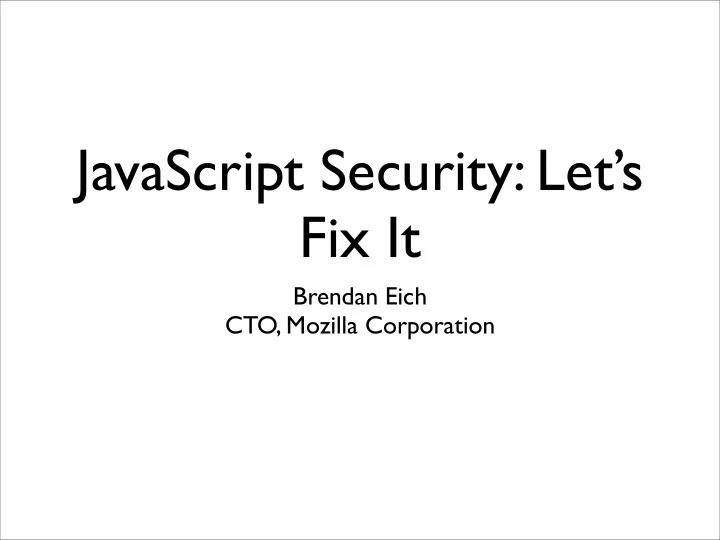

JavaScript Security: Let’s Fix It Brendan Eich CTO, Mozilla Corporation
(We could bundle it)
bugs to fix • <script> injection: perl.com ⇒ pr0n.com (http://radar.oreilly.com/2008/01/dangers-of-remote-javascript.html) • lure.org has <form action=bank.com/...> and <script>document.forms[0].submit() • mashup.com has to trust maps.google.com if it loads <script src=maps.google.com>
helpful, yet not enough • ECMAScript, 5th Edition (ES5) • postMessage (IE8, Firefox 3, Safari 4, etc.) • http://code.google.com/p/google-caja/ • http://websandbox.livelabs.com • ADsafe, Jacaranda, other verifiers
why not enough? • “Advisory” -- no mandatory enforcement • No change to lax default cross-site policies • Variously complex • Tyranny of choice • Programmers always cut corners
FlowSafe • A Mozilla project (WebKit, chromium next) • Academic/industrial/open-source collaboration • Prof. Cormac Flanagan, UC Santa Cruz • Prof. Michael Franz, UC Irvine • Dr. Andreas Gal, Brendan Eich, Mozilla
challenge • Integrity is not enough: web developers need better confidentiality properties • Label pc, addresses, and all values • While not losing the JS performance wars • Improve the browser’s default security policy beyond SOP using information flow • Without static analysis for implicit flows
key ideas • Monitor all references • Efficient sparse labeling • Fail-stop “no-sensitive-upgrade” check to preserve non-interference • Trace-JIT fast path optimizations
implicit flow • Given a secret in x: • y = true; • z = true; • if (x) y = false; // taint y • if (y) z = false; // not z • Implicit flow from x to z
no-sensitive-upgrade • Assignment to variable y must fail-stop if original label of y ⊂ pc (label of x) • Principle: code conditioned by secret (x) can’t upgrade a non-secret (y) • Script may call upgrade(y) before if (x) ... to continue rather than fail-stop • Leak “half a bit” in the x == false case
sparse labeling • A value v is either unlabeled raw value r • Or else a pair r k of raw value r and label k • Label with respect to implicit label pc is • label pc (r) = pc • label pc (r k ) = pc ∪ k • Semantic rules split into fast, slow paths
more sparse labeling • Implicit label pc applies to same-origin code and data; other-origin gets explicit label • Implementation: implicit label per GC page for fast access and low space overhead • Explicit label requires a transparent box or lightweight wrapper
fast vs. slow path • Constants and local variables are unlabeled • Calling unlabeled closure entails no labeling • Calling labeled closure labels return value • For var x = r, leave label pc on r implicit if label(x) = pc • For var x = r k , enforce no-sensitive-upgrade and pass only if pc ∪ k ⊆ label(x)
results so far • Big-step operational semantics • Correctness and non-interference proofs • SML implementations for unlabeled, sparse, and universal labels • Unlabeled / sparse / universal: 1 / 1.2 / 1.7
policy ideas • Prevent r k ∪ pc from flowing to any server with where eTLD+1(k) != eTLD+1(pc) • Save perl.com: label <script src=“...ad.js”> with k(“...ad.js”) ∪ pc, restrict DOM access, geometry, z-order, location.href = ... • Markup isolation + label tags = secure distributed mashups, GreaseMonkey, etc.
issues • Is fail-stop usable? may need conservative/ approximate static analysis • Explicit labels must round-trip through rendering/presentation back up to DOM (e.g., :visited tracking) • Timing, half-a-bit, other information leaks • Foolproof sanitize(v)...
comments welcome • cormac@ucsc.edu • franz@uci.edu • gal@mozilla.com • brendan@mozilla.com
Recommend
More recommend